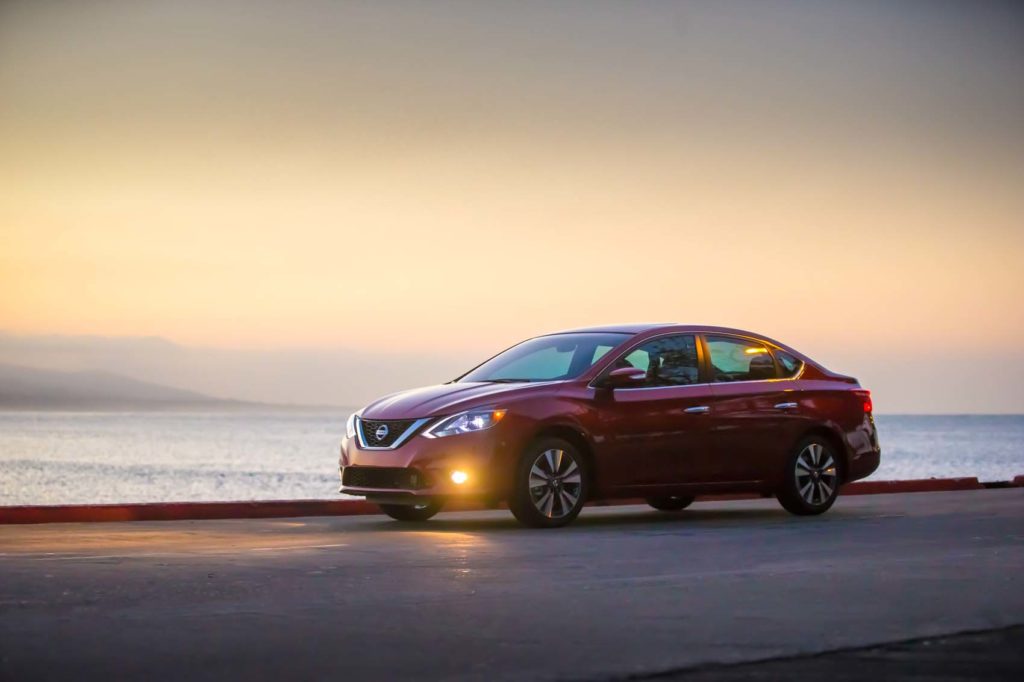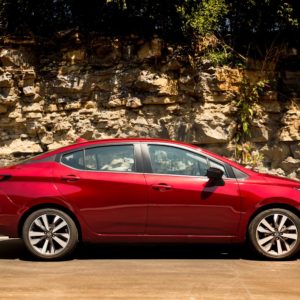One question you might be asking yourself is, “Are Nissan Sentras good cars?” The Nissan Sentra is a dependable sedan that looks good without being too flashy. While later generations may come with modern designs and the latest electronic features, an older Sentra can still give you a lot of bang for your buck. According to CarEdge.com, the Sentra has a fair resale value with its price depreciating by 23% after 5 years if the car is in good shape.
Are Nissan Sentras Reliable Cars?
When it comes to reliability ratings, the Nissan Sentra enjoys above-average scores from RepairPal. It scored 4.0 out of 5.0, placing it 14th out of 36 compact car models. The Sentra also costs less to own, drive, and maintain compared to other models in its class. Not only does it need repairs less frequently, but its most common problems are usually average in terms of severity.
Fuel economy is another plus for the Nissan Sentra. OfficialData.org showed that the 1982-2019 model years averaged around 27.4 miles per gallon with newer Sentras achieving higher mpg thanks to advanced fuel-saving features. Between its impressive fuel efficiency and its above-average reliability, a Sentra can last for many years. It can easily reach 100,000 miles or more with regular maintenance and prompt replacement of faulty parts.
Nissan Sentra Years To Avoid
While the Nissan Sentra has above-average reliability ratings overall, there are a few model years that you should avoid buying.
2005 Nissan Sentra
The 2005 Nissan Sentra was the first one to ever be released. Unfortunately, Car Complaints gave it the “Beware of the Clunker” badge of shame due to its poor safety performance. The Insurance Institute for Highway Safety (IIHS) gave the 2005 Nissan Sentra a “Poor” score for side and rear crash protection.
If you’re looking to buy a used Sentra, avoid the 2005 model for your own safety.
2013 to 2016 Nissan Sentra
Most of the seventh-generation Nissan Sentras suffered from engine, drivetrain, and brake issues. Car Complaints gave the 2013 to 2016 Nissan Sentras their “Avoid it like the Plague” badge.
The 2013 Nissan Sentra suffered from unusual shaking, stalling at high speeds, and total vehicle failure. Most of the 2013 Nissan Sentra issues revolved around its drivetrain, brakes, and engine. Drivetrain issues resurfaced in the 2014 Nissan Sentra, and the jerking and engine issues were still present. The 2014 Nissans Sentra was also noisy and underpowered according to Consumer Reports.
Things didn’t get much better for the 2015 Nissan Sentra, which shared the 2013 and 2014 Sentras’ drivetrain problems. The 2015 Sentra also had various transmission issues. Finally, the 2016 Nissan Sentra continued the problematic drivetrain trend, and Consumer Reports labeled the 2016 Sentra “cheap and underdeveloped.”
Top Nissan Sentra Problems
Having seen continuous production for more than three decades, the Sentra has its fair share of problems. The specific Nissan Sentra reliability issues vary in severity and frequency according to the model year in question. Here are some of the model’s most common problems:
Poor CVT Performance
The 2019 Nissan Sentra has transmission problems, according to some consumers. The 2012 to 2016 Nissan Sentra also has transmission problems since many owners have reported that the car’s continuously variable transmission can cause temporary loss of power and total failure. When these problems happen to owners, they’re often faced with crippled vehicles and large repair bills. These problems are so widespread across owners that there have been class action lawsuits filed against Nissan.
Faulty Brakes
Brake problems are a recurring problem for Nissan Sentras. Many 2013 Sentra owners report that the brakes don’t engage after stepping on the brake pedal until it hits the floor. In some vehicles, the problem is caused by a master brake cylinder that failed prematurely. Replacing the bad cylinder will resolve the issue.
Even the relatively new 2020 Nissan Sentra isn’t immune to brake problems. Some units have anti-braking lock systems that can stop working without warning. When the ABS gives out while the car is on a slippery road surface, the driver can potentially lose control and end up in an accident.
Unusual Noises while Driving
Drivers of some units of the 2016 Nissan Sentra report hearing loud howling or screeching noises during windy days and when driving at high speeds. While some owners suspect it’s loose weatherstripping, others have had no luck determining where the sounds are coming from. The car could also vibrate enough to make noticeable noise at highway speeds.

Bad Paint and Trim
A plethora of body and paint problems hounded many vehicles belonging to the Sentra’s 2016 model year. The paint and clear coat on the affected vehicles’ bodies may fade early or flake off. Chrome trims could also develop rust, while moldings and trims may become loose and eventually fall off.
Suspension Problems
Affected 2017 Nissan Sentra suspensions may make loud thumping noises while going over fairly low speed bumps at 10-20 mph. The problem becomes more noticeable during the cooler months of the year.
Depending on the model year, the Nissan Sentra transmission can also make strange noises such as creaking, thumping, clunking, rattling, and popping. It may lose traction on a road surface covered by 1-4 inches of snow.
Strut assemblies that dampen the shocks from driving on uneven surfaces may also fail without warning. Bad struts will make your ride more bumpy and unpleasant until they are replaced.
Steering and Power Steering Woes
Some 2012 Nissan Sentra owners report that their vehicles pull to one side while being driven on the road. In some cases, the car drifts from one side to the other and back. This problem may arise even after the wheels have been properly aligned.

In at least one 2017 Nissan Sentra, turning the steering wheel can inexplicably make a noise similar to static. Other problems include difficulty moving the wheel while the vehicle is uncontrollably swerving from side to side.
Wheels and Hubs
There aren’t that many problems concerning Nissan Sentra wheels, tires, and related parts. Of the various model years, the 2008 Sentra collected the most number of complaints in this category.
Several drivers report that the tire pressure monitor light would switch on and remain illuminated when they started their car. This warning light normally indicates that the air pressure in one or more tires have dropped below recommended levels. However, upon checking the tires, owners often find no problem with the tire pressure.
A similar problem may arise in some units of the 2014 Nissan Sentra.
Drivers have also filed complaints about defective 2008 Nissan Sentra hubcaps and rims. The finish on the hubcaps may peel off, while the rims may corrode faster than expected. These problems can ruin the car’s appearance and also weaken the wheels.
Transmission Issues
Transmission issues are among the most common and serious problems that can happen to a Nissan Sentra. In particular, some units of the 2013-2017 model years have faulty continuously variable transmissions (CVTs). These transmissions are prone to losing power, which can cause shaking, stalling while speeding up, or total failure in the worst-case scenario.
Among its model years, the 2014 Sentra is considered the worst because of its many transmission-related problems. Aside from the bad CVT, owners also complain of unpleasant pulses and vibrations while the vehicle is not moving.
The Nissan Sentra is a good choice for a vehicle, but if you’re wondering about the best Nissan Sentra year to buy, then the 2006, 2009, 2010, or 2018 models could be a good choice. These models have the least reports from owners, so you can rest assured they won’t be lemons.
Both old and new model years will serve you well, especially if you take good care of your car. Whether you own a Sentra or plan to buy one, you can get the most out of it by familiarizing yourself with its most common problems and staying on top of its repair and maintenance.
Delivering a New Nissan Sentra Brake Master Cylinder to Your Home
If the brake master cylinder of your Nissan Sentra stops working, it’s best to stop driving your car until you have replaced the faulty part. But how can you get the new brake master cylinder if you don’t have another vehicle? It’s a good thing that CarParts.com delivers replacement parts like Nissan Sentra brake master cylinders to your doorstep.
CarParts.com operates a network of strategically located distribution centers across the US. When you purchase a Nissan Sentra brake master cylinder from us, our nearest location processes your order and ships your new part. You can receive the replacement brake master cylinder after several business days if you live in the continental US and order by noon ET. We only source our products from brands trusted by drivers throughout the US, so you can get the performance and reliability you deserve. Do you have questions about the fitment or price tag of our Nissan Sentra brake master cylinders? Our friendly customer service team is available 24/7.
Make CarParts.com your one-stop shop for replacement Nissan Sentra Brake master cylinders today.
Any information provided on this Website is for informational purposes only and is not intended to replace consultation with a professional mechanic. The accuracy and timeliness of the information may change from the time of publication.



















brakes are terrible on the 2023 nissan sentra model. Not reassuring braking power. As you are braking the car slightly lunges forward before making an actual stop. Choppy handling as well. I guess you get what you pay for. Only 300 miles on this vehicle and I am very seriously thinking about replacing it soon!!!!! That is sad!!!!!